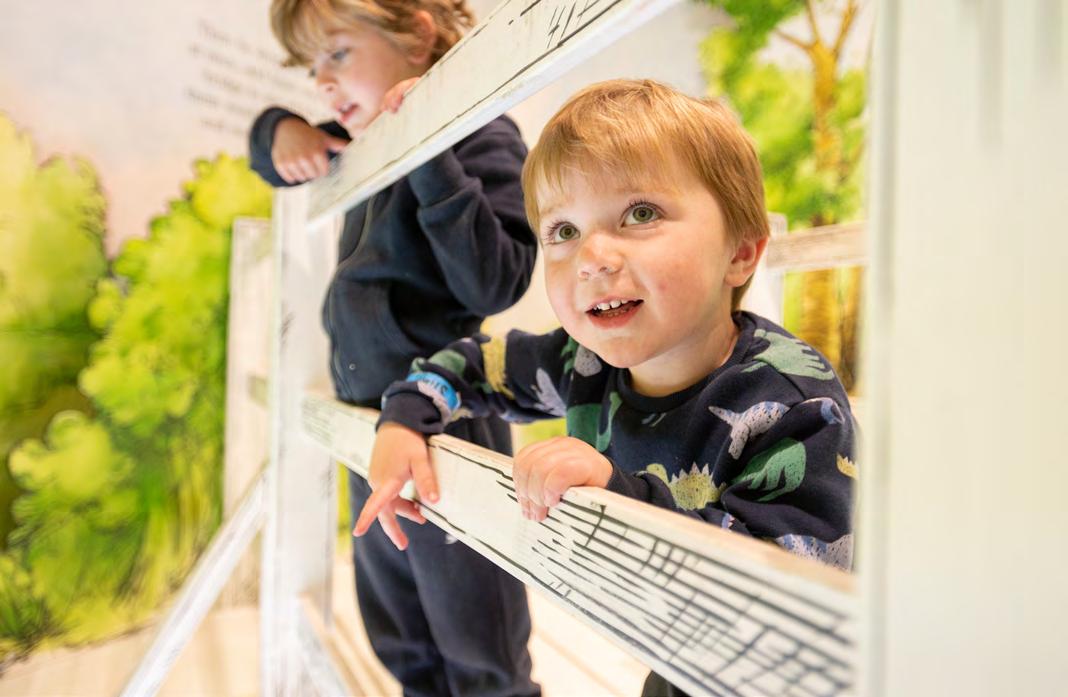Thames Valley East















Parents! Ever thought about being a cheerleader? Or maybe you used to be one?

Artemis Cheer has recently introduced an Open Senior Non Tumble Level 3 team - for dancers and athletes aged at least 15 (but most are 20+) who want to work hard, work out and compete. Training is every Sunday afternoon at Pinewood Gym in Crowthorne, and then join them for competitions in 2023. The team is non-tumble, meaning you don’t need high level gym skills (you do need to be ready to be part of a hardworking ambitious team though). Cheer technique is taught along with the dance elements.
This is an amazing way to keep fit, or get back into cheer. Artemis Cheer have classes for cheerleaders aged from just 3, so if you are a parent of an active child you could both work towards a hobby in common!
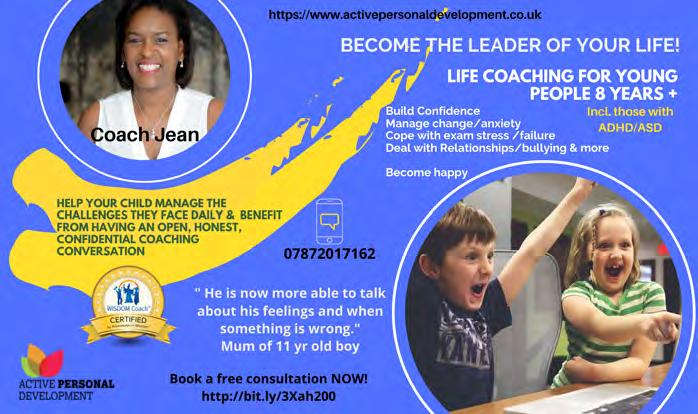
Artemis Cheer is non-profit and part of Artemis Studios. Two week free tryouts are available: cheercoach@artemis-studios.co.uk or www.bracknellcheer.co.uk
Wear A Hat Day, an iconic and fun annual event, is one of the UK’s most popular and family-friendly charitable fundraisers and it’s happening again on Friday, 31 March!
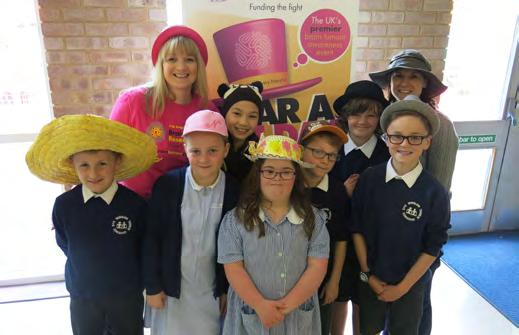
Running for more than ten years, this event raises millions for vital research into brain tumours – the biggest cancer killer of children and adults under the age of 40. Wear A Hat Day events help children explore their individuality and creativity, whilst learning to work together and think of others – in a really fun way.
Participation fosters friendships, creates better local and school communities, offers unique learning opportunities and provides new ways for children to explore ideas around different life experiences, all while giving hope to brain tumour patients and their loved ones. Join this event, as a family or by persuading your local school to take part. Register now for more information and your FREE fundraising pack. Just use the quick and easy webform at www.wearahatday.org
www.artemis-studios.co.uk & www.bracknellcheer.co.uk www.wearahatday.org
Please find below a proof of your adver tisem Januar y/Februar y 2017 issue (No. 88) of Fam

Please CHECK ALL INFORMATION IS CO especially dates, telephone numbers and ad

The award winning music classes for pre-school children which have been running across the UK for 30 years are now coming to Maidenhead and Windsor. From January, classes will be running at Maidenhead Community Centre on Thursday mornings and Gardener’s Hall in Windsor on Fridays.

Any changes need to be made at this stage
Any fur ther amendments will be charged for.
Monkey Music classes are run in a progressive, 4 stage curriculum, with classes suited to babies from 3 months, right up to 4 year olds. The 30 minute classes provide a warm, friendly environment for your little ones to thrive in whilst they sing, play instruments, dance, listen to magical sounds, play with sensory props and have lots of fun! All of the songs have been written with your little one’s development in mind, whether it’s social, language, physical or musical. The classes are a great way for you to share precious time together whilst having fun and making new friends. Free open days are running on 5th and 6th January. Your first class is also free, so if you would like to book a free trial or join one of the open days, please contact Sally on 01494 819138 or maidenhead.windsor@monkeymusic.co.uk or visit the website linktr.ee/monkeymusicmaidenheadwindsor “Far and away the best class we have done. Over the past two years I’ve seen the girls develop listening skills, musical rhythm and most importantly have a wonderful time in classes and then at home”.
Please contact us by return either to amend or a adver tisement
Happy Spring Term! Perform’s confidence-building classes are sure to blow away the winter cobwebs and help children feel energised and inspired. This term sees children aged 4 to 7 trapezing and somersaulting into a Circus Adventure whilst those aged 7 to 12 work on a fun and funky adaptation of Robin Hood, in Outlaw. Imaginations will soar as children work towards a magical performance for family and friends.
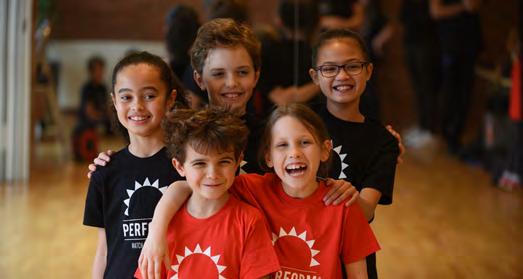
Perform is not like other children’s drama schools. Its classes have a special emphasis on child development and use a mix of drama, dance and singing to bring out every child’s potential. Run by experienced actor-teachers, Perform classes focus on developing the 4 Cs: Confidence, Communication, Coordination and Concentration. With all abilities welcome, children can join at any point in the term and will take part in the performance. The only requirement is to get ready to have the best fun of the week!
Visit www.perform.org.uk/try, email enquiries@perform.org.uk or call 020 7255 9120 to book a FREE trial class in one of the following venues:
St Peter’s Centre, 1 Thorney Lane North, Iver SL0 9JU 4-7s Tuesdays 4pm; 7-12s Tuesdays 5.05pm
Boyne Hill Infant School, Rutland Road, Maidenhead SL6 4HZ 4-7s Saturdays 9.30am; 7-12s Saturdays 11.15am
All Saints Church Hall, The Causeway, Marlow SL7 2AA 4-7s Mondays 4pm; 7-12s Mondays 5.05pm
Hilltop First School, Clewer Hill Road, Windsor SL4 4DW 4-7s Fridays 4pm; 7-12s Fridays 5.05pm
Virginia Water Community Centre, 3 Beechmount Ave, Virginia Water GU25 4EY 4-7s Mondays 4pm; 7-12s Mondays 5.05pm
4 Marlow Road Youth and Community Centre SL6 7YR 4-7s Fridays 4pm; 7-12s Fridays 5.05pm
Contact: T: 020 7255 9120 / enquiries@perform.org.uk perform.org.uk/try
For more information visit www.perform.org.uk/try

Running between February 11 and 19 the farm’s annual ‘Lambwatch’ event is perfectly timed for the half term holiday where guests will be able to see new lambs born over the course of the nine-day break. Visitors will have the opportunity to learn all about lambing and see newborn lambs take their first steps in the Little Hooves Lamb Nursery.
Assistant General Manager, Louise Winslow said: “We love February half term on the farm! With new lambs expected to arrive throughout the school holiday it really feels like Spring is on the way! There will be plenty of lambs to watch at Lambwatch and some lucky guests will also have the chance to see lambs being born during their visit.” The knowledgeable livestock team at Odds will also be on hand to explain lambing to little ones.
T: 07867 514138 / 07753 414605
E: editor@familiestveast.co.uk

Louise adds: “Back by popular demand is our lamb-themed trail around the farm which gets families exploring the rest of the farm with a prize at the end for all the children who complete it. We will also have our arts and crafts marquee set up and we can’t wait to see everyone’s b-ewe-tiful creations.”
Little People Media, 29 Furrow Way, Maidenhead SL6 3 NY
There is also plenty of weather-proof fun at Odds Farm Park in the indoor soft play barn, and outside all the animals will be more than pleased to meet ewe.
Visit www.oddsfarm.co.uk or like and follow @OddsFarmPark on Facebook and Instagram for all the latest news and updates.
For more information visit www.oddsfarm.co.uk
We are an Ofsted rated ‘Outstanding ’ nursery providing high quality day care for children from three months to five years. Set within bright, modern Windsor Leisure Centre, our setting includes a large toddler room, pre-school room, a new snuggly baby room, and spacious outdoor garden.
Open 51 weeks a year – Accepts 30 hours funding – Highly trained team
Come and look around today: Call: 01753 855543 or email: info@theriversidedaynursery.co.uk www.theriversidedaynursery.co.uk
Choosing the right school for your child is one of the most important decisions you will ever make. However, sometimes a change in circumstances leads to a need to change schools part way through the academic year. There could be several reasons why you would be considering changing your child or children’s school during the academic year. These might range from relocation to children needing to be more academically challenged, or their current school just not being the right fit for the child.
Miss K Nijjar, the Head at Long Close School commented, ‘‘Whilst traditionally, the main points of entry are Nursery, Reception, Year 3 and Year 7, Long Close school have welcomed many children mid-year in all year groups, throughout the course of the academic year. We would be delighted to welcome you to the school and show you how well your child or children, could settle into Long Close, during any stage of the academic year. We pride ourselves on the rich and stimulating school experience that we offer, and the academic achievements that our children gain throughout their time at Long Close’’.
Book a private tour with their Admissions Registrar or a visit during one of their upcoming open events, which is the perfect way to find out more and answer any questions that you might have. To register your interest, call 01753 520095 or visit www.longcloseschool.co.uk/admissions-and-fees/open-days-visits
For more information www.longcloseschool.co.uk
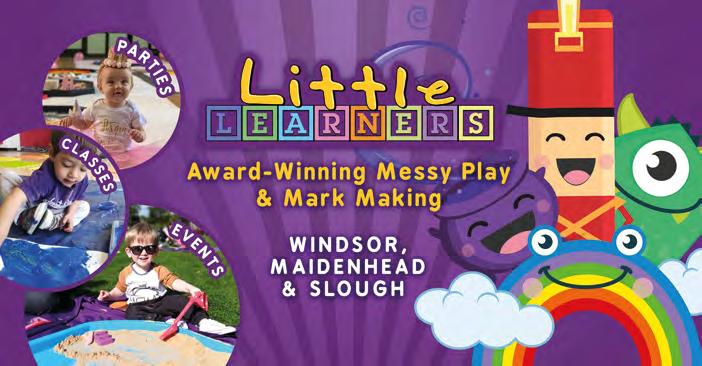
National Storytelling Week takes place from 28 January to 5 February and during this period, stories will be told in schools and theatres, pubs, museums, village halls, community centres and in many other places across the UK.
Speech and language therapists believe that storytelling is vital for children’s academic success as it promotes narrative skills and strengthens the ability of children to correctly sequence ideas. To be a good reader and writer a child needs firstly to be a good speaker and listener.

Above all though, storytelling is fun. Whether we are listening to someone else’s story or telling our own, inventing and adapting stories can open doors to exciting new worlds — both real and imaginary.
To find a local event, visit www.sfs.org.uk
From 6 to 12 February, families across the UK are encouraged to take part in Children’s Mental Health Week organised by charity Place2Be, with the theme Let’s Connect.
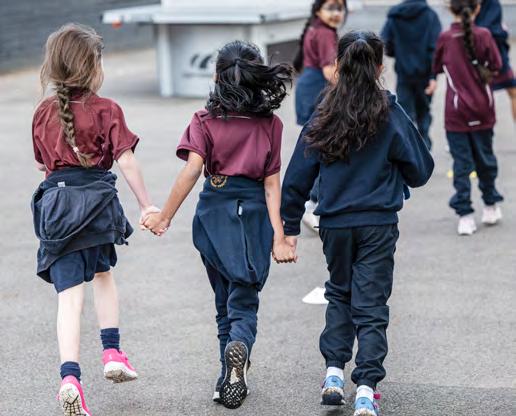
Let’s Connect is about making meaningful connections for all, during the week and beyond.
People thrive in communities and this connection is vital for our wellbeing. When we have healthy connections – to family, friends and others – this can support our mental health and our sense of wellbeing. And when our need for rewarding social connections is not met, we can sometimes feel isolated and lonely – which can have a negative impact on our mental health.
Help raise funds by organising a Dress to Express fundraiser. Find FREE resources for parents and carers and more information at www.childrensmentalhealthweek.org.uk
To find out more visit www.childrensmentalhealthweek.org.uk
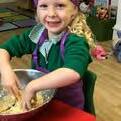
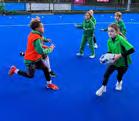

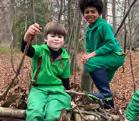




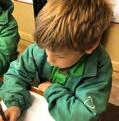
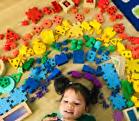
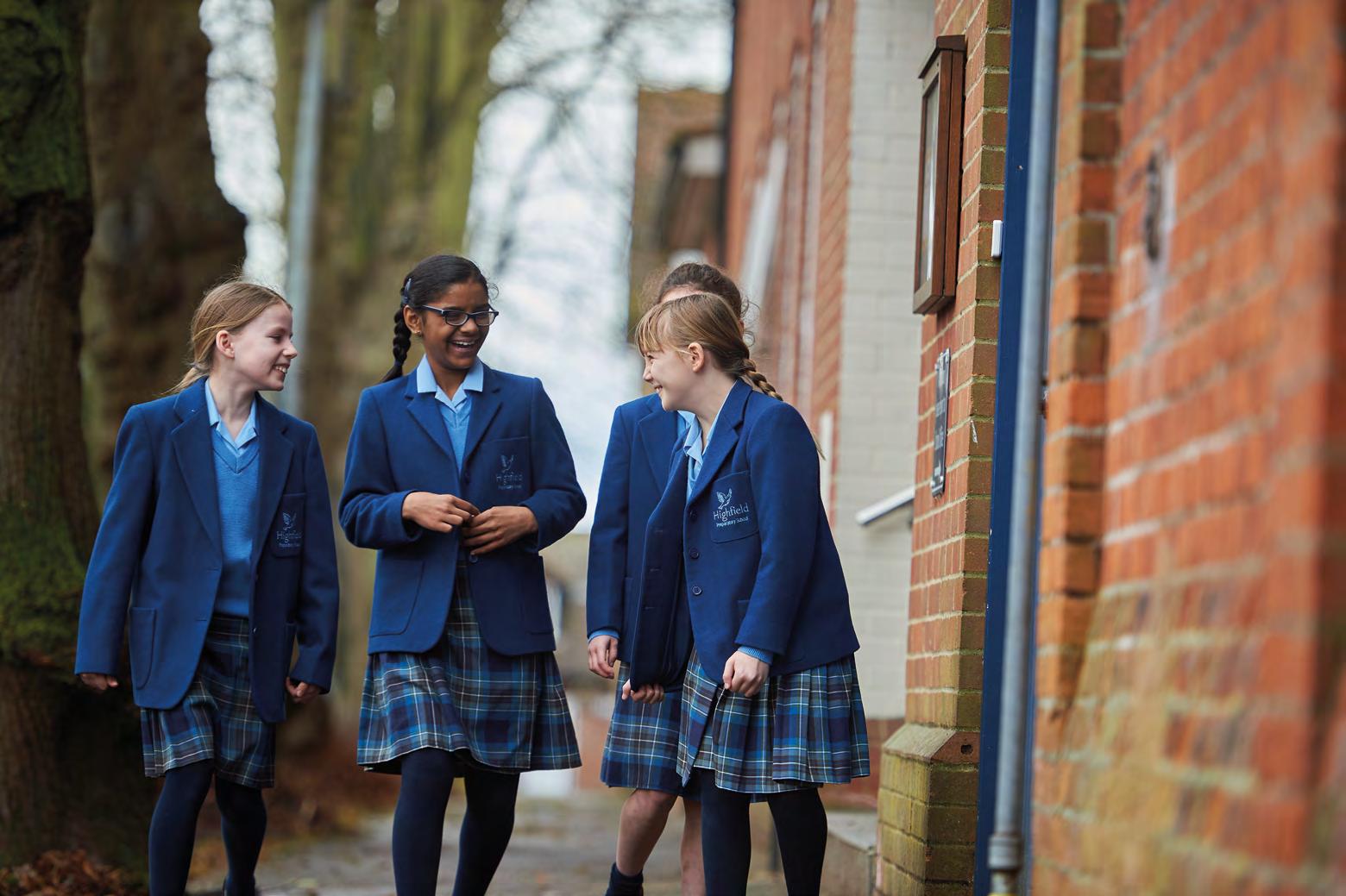




 By Dr Jamie Lingwood
By Dr Jamie Lingwood
Early language development is incredibly important and sitting down to read with your child gives them a big advantage. Here are my thoughts on the ‘hows’ and ‘whys’ of shared reading.
Shared reading is so much more than simply reading books aloud from start to finish. It’s powerful as an interactive experience, creating a conversation along the way. Evidence suggests that asking children lots of open questions about books can really boost language skills. Exposure to new words builds their vocabulary and the more they hear spoken language, the more easily they can use it themselves. The earlier you start, the better their reading ages will be at school. Research has demonstrated how shared reading protects against a lot of language difficulties and delays. It can even predict how successful children could be as adults in terms of income!
Parents, grandparents, carers or sibling will each have their own reading styles; and that’s a good thing. Find the flow that comes most naturally to you, making the experience more interactive as you go along.
Picture books with few or no words are great starting points. A good example is Hug by Jez Alborough, which simply repeats the word ‘hug’ on each page. It’s then down to the adult to create a story around this, starting a conversation with the child. Talking with them about what they see and what they think about the story naturally involves using a mix of words and grammatically structured sentences. The book becomes a prompt for children to express themselves.
I hear this a lot from parents: ‘My child wants to read the same book over and over again.’ As an adult, what do you do? Do you read the book for the thirty fifth time this week or encourage
them to read something else? A recent study suggests that reading the same book repeatedly can help with a child’s memory, in terms of building familiarity with particular words. The biggest challenge is your stamina - knowing it’s all in a good cause might help here!
When it comes to shared reading, little and often is the way forward. You don’t have to sit down and rigidly read with your child for a set hour at a time. Five minutes here and there is just as useful, particularly when it comes to keeping them motivated.
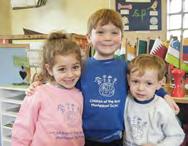

Fit reading around what works for you and the structure of your own lives. You may well choose a time towards the end of the day when you’re settling them down for bed. But for a lot of people, that isn’t successful because, by that point, their child is too tired to engage properly. Remember it doesn’t have to be bedtime. Pick a different point in the day. Or grab five minutes when you’re travelling on the bus together, for example.

Do it yourself! When your child sees you reading and clearly enjoying it, they will want to copy you. This will help them develop a habit that will open up a lifelong world of adventures and learning.
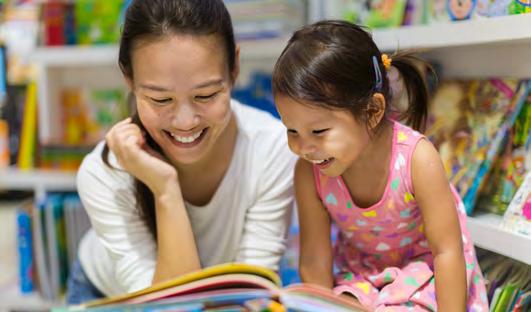
Dr Jamie Lingwood is a Lecturer in Psychology at Liverpool Hope University (www.hope.ac.uk/psychology) and belongs to the ChildLab research group, a group of psychologists and educators who are interested in researching how children develop and grow.
We
We
Home
Home
Home


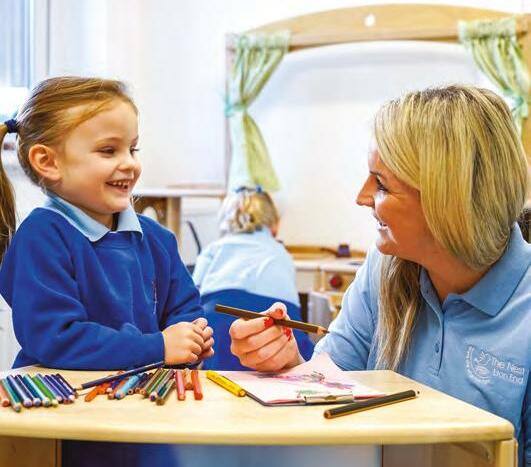
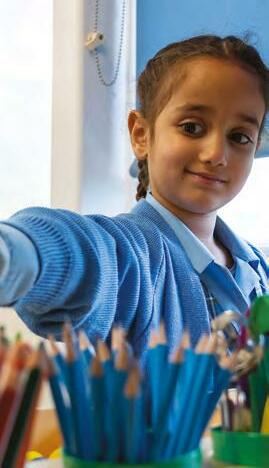 By Usha Patel
By Usha Patel
My 6-year-old nephew came around the other day for tea and cake. In the middle of a conversation, he loudly declared he was on his eighth ‘mini-cake.’ These were bite-sized morsels made for tiny hands. It made me chuckle that a child of just 6 years would think to measure the increasing joy that eating cake could bring! I looked down at my plate and wondered how many I had gobbled up….
However, many children don’t see patterns, numbers or the need for measuring.
A 10-year-old student I recently worked with really wanted to play football but was reluctant because she had great difficulty tying her shoelaces. I taught her how to do it in five easy steps, explaining that she would achieve her goal but that some steps might be trickier than others.
Before our work together, she had thought of tying laces as one task. By breaking down the task into a series of logical steps, she could see which parts were more complex and which were manageable. She quickly got the hang of it by paying closer attention to those bits she thought were fiddly and not feeling as frustrated as she had before.
With my instruction, she practised regularly at home and each time she would get faster at the bits she found tricky. When she returned a couple of weeks later, she boasted she could now tie her laces very quickly and insisted on showing me with her brand-new trainers.
So what does this teach us? That when tasks are broken down into logical steps, success is possible.

When a child does not apply logic and reasoning to a difficult task, how they feel about the task dominates their approach. But we can’t measure feelings in the same way we can measure steps - or even cake! They are not objective and so the cycle of frustration continues and a child reinforces an unfair bias against their own ability.
Measuring progress allows a child to see for themselves what is going wrong. They then can problem-solve, achieve success and meet their intended goal.
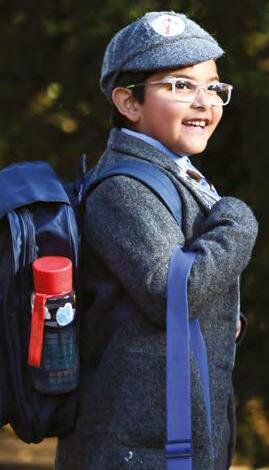
Logical thinking takes time to nurture but once success is achieved, parents should celebrate. Decide on another goal and repeat a similar logical process.
Usha Patel is a neurocognitive therapist who runs Raviv Practice London (www.ravivpracticelondon.co.uk).
There are many different strategies which enable someone to ‘be the best they can be.’ In the adult world, the two commonly debated methods are coaching and mentoring. Whilst they are often discussed together, they are in fact two different concepts. As a mentor to teens and tweens, I have often found myself wondering if mentoring would work for primary aged children?
Some in the field of education may feel that mentoring is not appropriate for children of this age. How can you mentor someone who is just getting to grips with learning, formulating their ideas and their opinions?
However, mentoring can be very effective in instilling a love of learning, enabling open discussion and promoting self awareness at an early age. At its most simple, a mentor is ‘an experienced person who advises and helps somebody with less experience over a period of time’ 1. This period could be whilst a young child gets used to a new classroom or a change in family circumstances.
A mentor offers advice, using the benefit of their experience but always taking into account the fact that the child is an individual and that their background and experiences in life may be very different to that of the mentor’s.

Mentors do not have to be adults - instead, mentoring can be a peer-to-peer setup, with volunteer opportunities galore for schools to trial peer to peer encouragement and support techniques. Mentoring is about helping a child to recognise their true qualities and abilities, rather than moulding them into something that is not true to themselves.
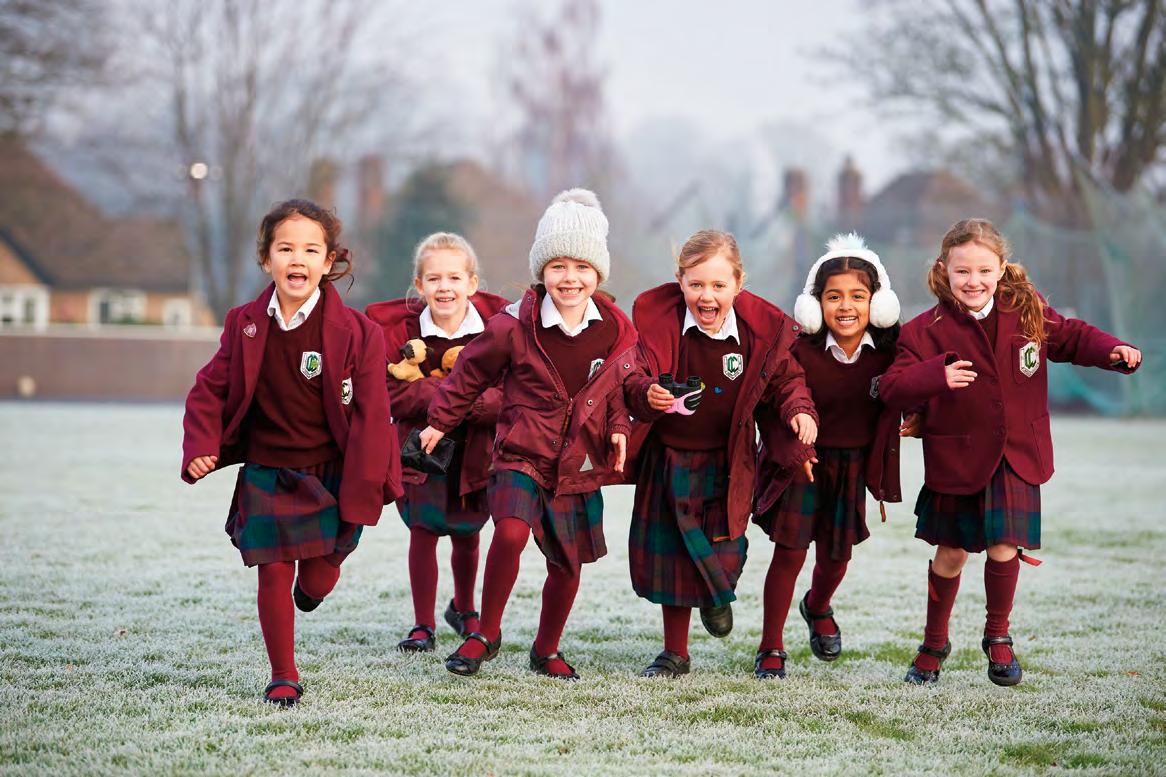
If a child is interested in sports, a good mentor will connect with them, using this interest, even if it isn’t necessarily a shared interest between them. A mentor guides but also allows a mentee to discover who they are.

Having a mentor or studying in an environment such as a classroom with a mentoring ethos can help children to get to know themselves and make sense of the world in which they find themselves.

In the age of social media, with an ever-increasing number of platforms telling children who they should be, I think mentoring is more important than ever to help children peel back the curtain and feel as if they have the permission to be their own person.
Jemma Zoe Smith is Director of The Education Hotel (www.educationhotel.co.uk).
1 Oxford Learner’s Dictionaries definitionis brought to life outside the classroom with swimming on site, bushcraft, gardening club and sports galore!
Based in the heart of Windsor, Upton House is a thriving Nursery, Pre-Prep and Prep School for boys and girls aged 2-11 years.


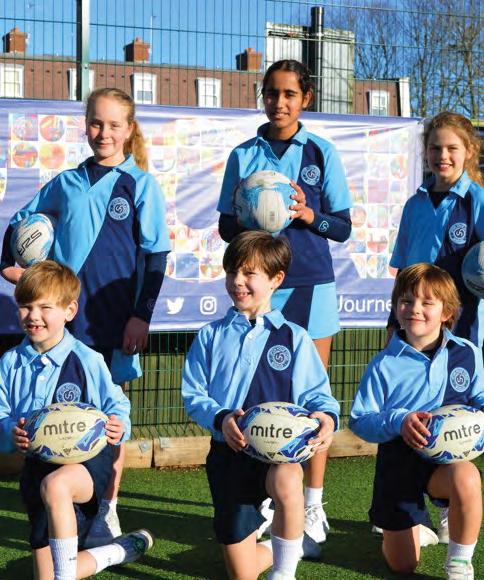

Self-esteem and happiness, we believe, are paramount to each child’s success and we pride ourselves on developing confident and happy children with a love of learning. Call 01753 862610 or email registrar@uptonhouse.org.uk
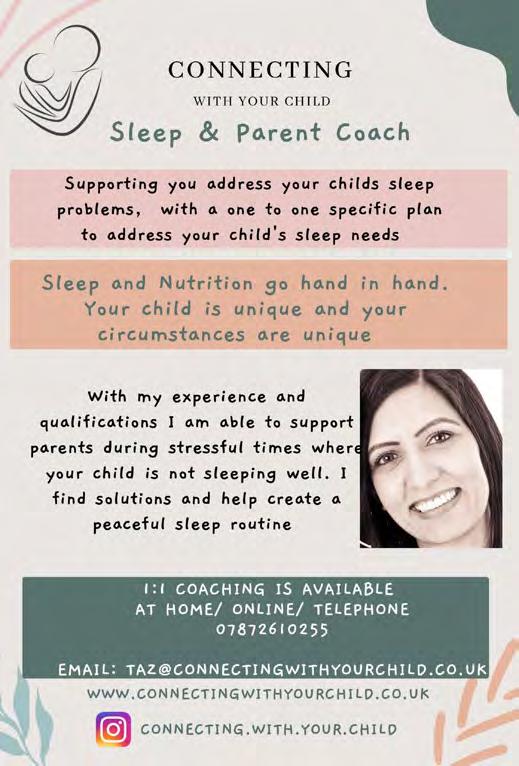
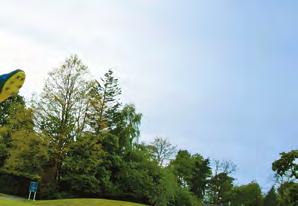 By Jessica Joan
By Jessica Joan
In May, Year 2 (KS1) and Year 6 (KS2) pupils will take their SATS exams. Yet, from their very first day at school, children are being trained to be able to perform in preparation for these assessments.
So much work goes on behind the scenes in other years to get children ready and when it comes to the year in which they take their SATS, teachers are under pressure for them to do well.
To prepare for the exams, your children will be doing lots of maths, reading and writing at school, intertwined with other subjects so that they are consistently practising those skills. Sometimes this means that other foundation subjects are deemed ‘not as important’ and additional maths and English lessons squeezed in instead.
So how can you ensure your child does well in their SATS?

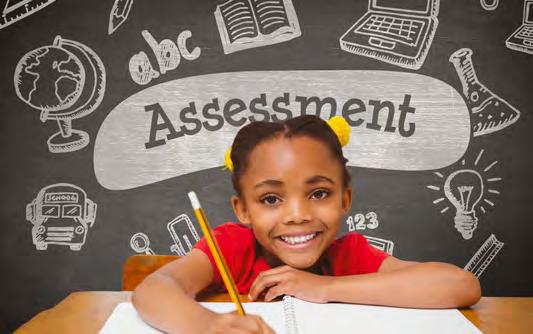
Your child’s school will more than likely be sending home maths, English and reading homework in preparation. It can be difficult to make your child do homework, especially when they have been worked so hard during the school day; however, it’s an important support in preparation for SATS so anything you can do with your child can really make a difference to how they perform.
Providing your child with any opportunity to read, write and do mathematical calculations will be massively appreciated by your child’s teacher!
In addition, you can download and look at past SATS papers
from previous years (www.sats-papers.co.uk) to get an idea of what your child will have to do. There will be some things that have changed since you went to school so ask your child to show you how they do things - they will relish this opportunity!
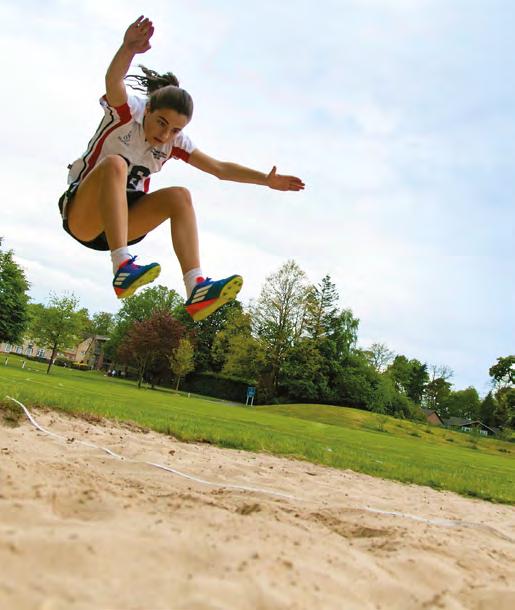
Likewise, you can always speak to your child’s teacher who will happily show you how you can support your child’s learning at home.
As well as these things, ensuring your child eats well and stays hydrated will support their minds and bodies during the school day. Similarly, creating a good bedtime routine will mean your child gets a decent night’s sleep and has the brain power to be ‘on the ball’ throughout the school week.
Jessica Joan is a primary school teacher from Worcestershire with a ten year teaching career. After experiencing burn out, she set up as a Work/Life Balance Coach for stressed out teachers and launched her Happy Teacher Course. Find out more at www.jessicajoan.co.uk
The government previously announced its plans to scrap KS1 SATS (Year 2) after the introduction of the Reception Baseline Assessment (RBA) which began in September 2021 and is taken by all new primary school pupils. However, it has since been decided to make KS1 SATS (Year 2) optional for schools from September 2023 instead.

The RBA is usually done with a teacher in an informal setting during a child’s first six weeks of school. It is an activity-based assessment conducted via a number of practical and interactive tasks. There have been pilots done all over the country and the validity report confirms that this new assessment provides an ‘accurate’ starting point from which to measure the progress a child makes in primary school.
To my knowledge, this change is welcomed amongst primary school teachers across the country as it limits the amount of pressured standardised testing that takes place during a child’s early school years. Primary school is a time for children to explore their learning through play and their own curiosities.
It’s a common scenario; the toddler who actively resists being left with anyone else, struggling to separate from parents or loved ones. So what can you do to make separating from your toddler easier?
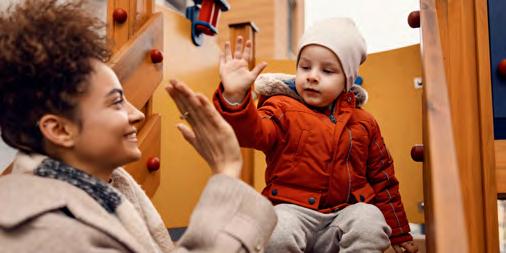
Most children go through a phase of being overly attached to one or both parents at some point in their early years. The tears can make leaving them at nursery or with a childminder heart breaking.
Kate Harding’s toddler would cling to her every morning when they arrived at nursery. ‘She wasn’t upset when she woke up in the morning or even in the car as we drove to her early years setting but once it was time for me to leave it was the same every day’ Kate says. ‘She would cling to my leg and literally have to be peeled off by one of the staff. Often I’d leave upset and in tears myself. On those days, no amount of reassurance from her key person that she was well and thriving would make me feel better.’
Experts say that it’s completely normal for young children to go through what could be described as a clingy phase and it’s an important part of their development.
For many, anxiety at being separated from a parent begins at six to nine months. It’s around this time that babies become conscious that they are separate little beings and are not the same person as their parent.
For some, this clinginess can last for a couple of years or more and can get worse when they go to nursery or a childminder.
As difficult as it is to be separated from a crying, anxious child, it’s best not to avoid leaving them. Explaining why you need to be apart, saying goodbye, telling them when you will be back and reinforcing the positives of this, is all part of teaching your child how to be resilient.
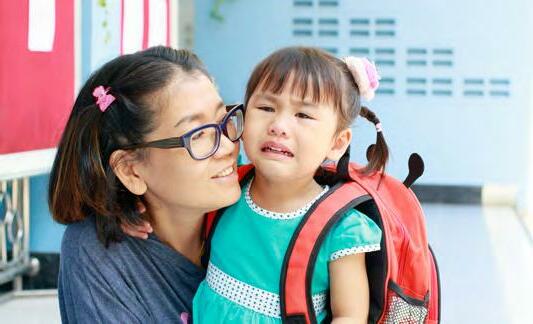
Take a deep breath and walk away. Your child is in safe hands and will thrive, as they will discover for themselves over time.
Kate says: ‘I would tell my daughter that I had to go to work so we had money and remind her how much fun it would be to play with her friends. Often this did the trick.’
Dorothy Lepkowska is an award-winning journalist, author and freelance writer for the Early Years Alliance (www. eyalliance.org.uk). You can read more of her parenting features at www.familycorner.co.uk
Nurseries and pre-school settings understand the importance of a settling-in period before your child starts officially. You might stay with your child for several sessions, gradually leaving them for longer periods. Your child’s key person will work with you to settle your child. This helps them get used to their new surroundings and helps you both become familiar with the staff and children.
Remember, this is all new for your child so it’s not surprising they might feel uncertain or anxious.
‘I always tried not to sneak out of the nursery when leaving’ says Kate, ‘but to give her a kiss, wish her a good day and wave through the window. At times it was hard to stay calm and collected while she was upset but as she got to know the routine the crying stopped. In any event, even at her worst, the staff always assured me that she calmed down once I’d gone and got on with the day’s activities. It was probably worse for me, in fact!’

Early years experts say that while parents might be tempted to seek reassurance that their child is okay by returning to the setting, this can be disruptive and unsettle their child all over again. All that is achieved is the transference of the parent’s anxiety to the child.
Instead, a quick phone call to the staff is usually enough to reassure you that everything is going well.
However, if a toddler remains unduly upset by separation for a prolonged period it might be worth investigating if there are other reasons for them feeling unsettled. Talk to your child’s key person or childminder about your concerns. They are best placed to advise you what is best for your child, even if this means delaying their start at the setting for a few weeks or extending their settling in period.
Kate adds: ‘My own experience and those of other parents I know, is that this separation anxiety is a temporary thing. There will come a day they run in without even a kiss goodbye.’
Choosing a nursery is a big decision and a personal one for any parent. Anna Collins talks to Prerna Shah, the managing director from Monkey Puzzle Day Nursery, Maidenhead about what to look for in a nursery and ensure you have the best fit for your child. The nursery, set on Grenfell Road, not far from Maidenhead Station, has recently attained a well-deserved ‘Good’ rating from Ofsted.
What is it about your nursery that parents love?
We build positive partnerships with parents and carers to ensure their child learns and thrives at the nursery. We use an online portal to update parents with the regular posts that show off pictures and videos of the amazing learning experiences the children enjoy each day. This also allows parents to communicate with their child’s key person.
Describe your nursery in 10 words
We create an environment where children, their families and our team continue to learn, share, laugh and grow.
When would you recommend starting to look for a nursery and what are the main things to look out for?
I would say, look for a nursery space as soon as your child is born or even during pregnancy. The main things to look out for are:
• Safety and Security: Is your child going to be safe and secure in the setting?
• Staff from all age groups: A balance of older and younger staff works really well for children so they can learn from all! That way children receive love and nurturing as well as energy and enthusiasm.

• With technology around us, it’s important for children to explore and enjoy nature. An outdoor space for children to play in is a huge bonus to their well-being.
What would a typical day look like at your nursery?
A typical day here at Monkey Puzzle starts with a healthy breakfast, followed by activities, garden time, snack and lunch time; afternoon nap followed by healthy snack, activities (messy play, sensory, dance, music, sports, etc) followed by tea and indoor/outdoor activities before home time. How do you incorporate outside activity into the children’s daily routine?
Our outdoor play equipment promotes open ended play in the garden, encouraging children to explore and learn. We have an excellent selection of moveable items to bring physical play to the garden. These build confidence in both gross motor skills and climbing, and fine motor skills with creative outdoor learning. Monkey Puzzle Maidenhead offers a special gardening area where we grow our own vegetables, plants and herbs. The children help the practitioners look after the plants, digging, raking, watering and then harvesting the crop. We don’t just study the plants; we also study the bugs and insects that live there too.
All our children get the opportunity to go on local educational trips, and whether it be to the local shops or places of interest, we always risk assess our outings to ensure children are safe and secure while they are out and about.
We organise a variety of outings, trips and various experiences for all age groups. For example: visits to a local park, a farmer’s fruit & veg market, Costa Coffee, a local supermarket and Odds Farm Park and we have visits from key professionals in the community too, such as Zoolab and the Fire Brigade and Thames Valley Police as well as the all-important icecream van!
Starting nursery can be a big step for parents as well as children. How do you help children settle in and ensure parents still feel involved?
At Monkey Puzzle Maidenhead we recognise that each child, parent, and nursery relationship is unique, and we use our experience to support everyone in making that transition into nursery life as smooth as possible.
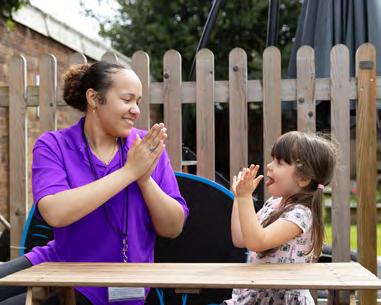
Our settling in sessions are unique and tailored to each individual child and their needs. The children’s wellbeing and happiness is our priority. The parents and staff work in partnership to provide each child with accurate starting points to begin to ‘scaffold’ their learning throughout their Monkey Puzzle journey. We have an effective key person system in place and this starts from the first session.
How do you support children with additional needs?
We have a SENCO in the nursery and we work with the RBWM SEND team to support children with additional needs.
If you would like to visit the nursery (located on Grenfell Road, Maidenhead), contact Prerna directly on 01628 637642 or email manager@monkeypuzzlemaidenhead.co.uk

Is your child always making mud pies, splashing in muddy puddles and making friends with worms, leaves or sticks? Do you embrace it or hate it?
We all have those memories of getting messy and muddy as a child but when it comes to our children, it can be difficult to allow them free rein. Yet scientific evidence now suggests young children who are encouraged to enjoy safe, outdoor muddy play will go on to develop stronger immune systems than children who are discouraged from it, leading to better overall health.
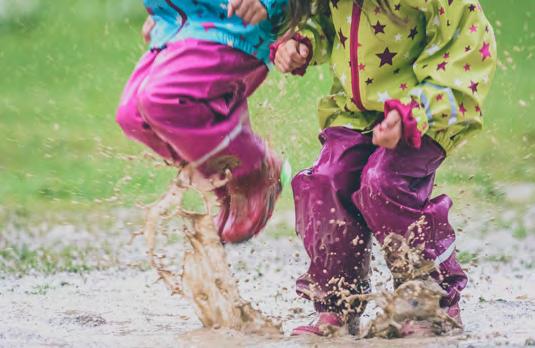
In the last decade, over sanitised childhoods have contributed to higher cases of allergies in the western world1. The percentage of children diagnosed with allergic rhinitis and eczema has trebled over the last thirty years.
Meanwhile, other studies have also found children who grow up on farms, with easy access to farm animals and the outdoors have a lower risk of developing asthma2. The reason behind these findings is an immune system that is exposed to bacteria and viruses when young and becomes strong, meaning it is much less vulnerable to allergies and asthma.
The best way is to get your child outside as much as possible, from as young an age as possible. Touch trees, leaves, grass and mud. Play with sticks, jump in puddles and breathe fresh air. Forest schools are now a popular alternative to traditional indoor nurseries and forest school activities run by Forestry England and the National Trust are increasingly common during the school holidays.
Locate your closest natural play area - playgrounds made from natural materials; some even have options for den building and mud kitchens. Not only are you giving your child’s immune system a boost but being in the fresh air has countless other physical and emotional benefits. Instilling a love of the outdoors from a young age will continue the healthy habit of getting outside.
You can also give young children regular exposure to safe bacteria through mud kitchens and gardening. This helps bolster their immune systems from an early age, contributing
to a more diverse range of bacteria in the gut and skin. Recent research has found a direct link between diverse microbes in a child’s gut and potentially chronic conditions like obesity, diabetes and even healthy brain development. If you don’t have access to a garden, consider a local allotment or community farm project where children learn about how our food is grown AND get their hands safely dirty.
Children who grow up with a pet, especially dogs, are also known to have a healthier immune system because of the dirt an animal naturally brings in. Use common sense with this though. Don’t play in muddy areas to which cats or dogs have regular access so you can avoid harmful bacteria your child may not be used to. Always wash hands with warm soapy water.
Messy and muddy play requires patience and a relaxed attitude – from you!
Don’t put children in their best clothes outdoors; a second-hand puddle suit and old wellies will suffice.
Don’t wait for a sunny day. If the weather isn’t perfect, remember, you need rain to create that mud.
Get involved yourself. Just because you’re an adult doesn’t mean you have to miss the fun and it might even help your immune system!
The saying ‘a little bit of dirt never hurt you’ really is true.
1 www.allergyuk.org/about-allergy/statistics-and-figures/
2 www.newscientist.com/article/2206654-microbes-from-farms-may-protectchildren-from-asthma-even-in-cities/
Mud paintings. Add some food colouring to watery mud and paint on patio slabs or paper.
Mud sculptures. Mould mud into shapes and add pebbles, twigs and leaves.
Den building or mud houses. Use sticks as a structure and mud to secure them.
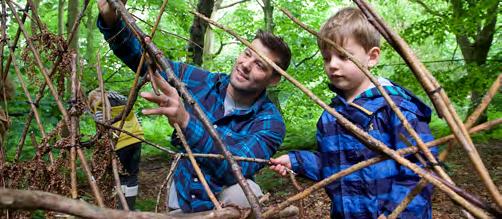
Mud towns. Get old dump trucks and plastic toy figurines to dig waterways and pour the water in.
And don’t forget some good old-fashioned splashing in muddy puddles. Make it a competition!
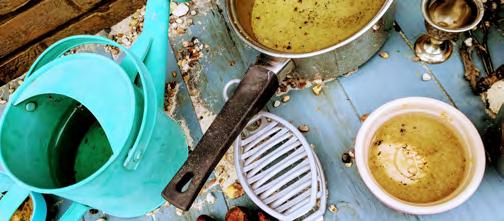
There are lots of way to enjoy the benefits of a mud kitchen without spending a fortune. Make one yourself by sourcing three wooden pallets, two for the base and one for the backing. Sand them down thoroughly before attaching them securely with ten-centimetre screws.
Next, use colourful exterior paint to brighten up the kitchen! Add old kitchen utensils, oven tray, washing up bowl, spoons and spatulas.
Then, just add mud!
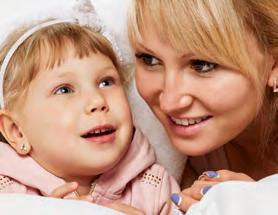
 By Claire Moreau
By Claire Moreau
Parenting is often marvellous and rewarding but it’s also complex, especially if your child is struggling with anxiety and you are unsure what to do next. Families asked Claire Moreau, a qualified mindfulness teacher, to share her tips for lessening children’s anxiety. Don’t be deceived by the simplicity of these…try putting them into practice – they do work!
Children absorb emotions like sponges and if they don’t know how to manage them, they can feel frustrated, powerless and overwhelmed. Overhearing the news or emotionally-charged adult conversation can fuel children’s anxiety. Teenagers can be alarmed by news threads on social media. Besides climate change and Covid, younger generations are now worrying about the war in Ukraine and its potential consequences.
Top tip: Avoid watching/listening to the news with young children; talk to teenagers about the news threads they follow; keep adult conversation amongst adults. Without altogether avoiding sensitive topics, discussions can be held within families in an age-appropriate way.
Children are more likely to express their feelings when they sense that we are fully available. Sitting in an area they pass by when returning from school or a weekend activity and gently inviting them to join us can be a start.

Teenagers might be more reluctant than young children to express how they feel. Letting them know that we’re ready to welcome whatever troubles them might not produce an immediate result, but, in time, it can prompt them to open up.

Top tip: tell them they have the right to feel overwhelmed or stressed – ‘it’s okay not to be okay.’ Listen intently to them without moving into ‘fix-it mode.’ Sometimes they just need a steady, listening ear.
Mobile phones are part of our lives and essential communication devices. Yet, the alerts and notifications keep us constantly looking at them and family members often have to compete.
Being fully present with the activity or conversation we’re having with our children - without being distracted by mobile phones - demonstrates that we value ‘real’ time together over virtual communication with other people and that we are fully available.
Top tip: at mealtimes, get everyone to put their phones away for a set length of time.

Research has found that too much screen time can lead to mental health issues in children, such as anxiety and depression. Most children prefer electronic media to playing and interacting with family and peers, which impacts their social development.
Monitor screen time, ensure the content is age-appropriate, communicate with children about inappropriate images and model healthy device habits.
Top tip: playing board games, reading and listening to music are great alternatives. Ask your kids to help you discover their musical tastes – this can lead to rich intergenerational conversations!
Small steps can go a long way. If they worry about the future, bring them back to the present moment—’right here, right now, with you, all is well.’ Tell them that you love them no matter what. These are both pillars of mindfulness.
Create a family routine that dissolves their worries even if only for a short time - in my family, every other Friday evening, homemade pizza is sacred. We catch up while cooking, then we watch a film together.
Top tip: Empower them by doing something as a family to help the situation they are worrying about – for instance, organise a car boot sale or a family run to raise money for charity.
The term nature-deficit disorder (NDD) was coined by Richard Louv in his 2005 book Last Child in the Woods. NDD can contribute to many problems, including higher rates of physical and emotional illnesses. The good news is it can easily be reversed. Spending time in nature is easier than we think: village greens, parks, commons and nature reserves abound in the UK. They provide the perfect setting for free family activities: walking, cycling, playing frisbee or racket sports helps lift the mood; watching nature’s life cycle is always a treat.
Top tip: Swap a meal indoors for a picnic, yes, even if it is cold! Nothing beats a good walk or cycle ride before returning home to a hot drink or meal.

With little ones, creating a comforting, wind down routine can help (reading a book together, listening to soothing music).
With teenagers, blocking the mobile phone at a set time is recommended. Finally, at all ages, placing hands on the belly, breathing easily and focusing on the breath, following the gentle movement of the belly that rises and falls. Counting the breath to ten (inone, out – two, in – three, out – four etc) over and over can quieten a busy mind.
Top tip: whatever their ages, no screens before bedtime. If, despite your best intentions and care, your child’s behaviour or anxiety level becomes worrying, it is best to seek medical advice. GPs can refer a child to a psychologist or occupational therapist with training in mental health.


Top tip: getting support for yourself while you’re supporting your children is critical. Charities like www.youngminds.org.uk run a parent’s helpline and provide free advice and support.
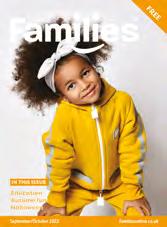
Claire has over ten years of meditation and yoga practice and three years of experience teaching mindfulness. She is particularly interested in how mindfulness can help parents and children develop well-being and cultivate emotional resilience, kindness and compassion. For more information on her courses, visit www.bridgemakermindfulness.com
There are many mindfulness apps/recorded meditations for adults and children which may help them to relax and unwind. However, nothing compares with attending a course with a qualified mindfulness teacher. Such a course teaches key mindfulness skills that help children and adults identify and manage emotions, improve concentration, relax and strengthen inner resources. Parents and children can benefit from simple exercises that help establish a strong mindfulness practice.

Top tip: children’s courses are only taught in person but many adults courses are now delivered on Zoom so it is easier to fit them around family life.
Reading not only provides a good alternative to screen time but it’s also relaxing. A 2009 study from the University of Sussex has found that reading can reduce stress by up to sixty eight percent. Just six minutes of relaxing into a good book can lower blood pressure and muscle tension. It’s a great distraction technique.
Top tip: reading can also become a special family moment—older children can read a story to younger siblings or parent and child can each read a page aloud.
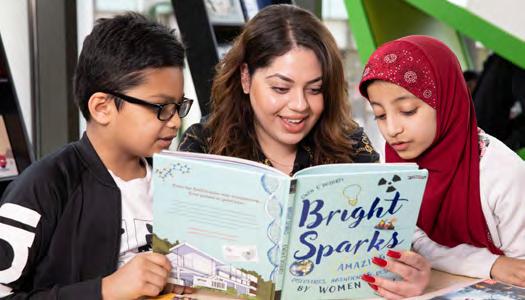
SLEEPING BEAUTY
Theatre Royal Windsor, 32 Thames St SL4 1PS www.theatreroyalwindsor.co.uk/sleeping-beauty
WELL BABY CLINIC
Riverside Children’s Centre, Maidenhead SL6 7JB
ALSO: Tuesdays: Poppies Children’s Centre, Windsor SL4 4XP
Thursdays: Datchet Children’s Centre, SL3 9EJ (SatNav SL3 9ER)
Fridays: Church Hall, Church Rd, Ascot SL5 9DP www.rbwm.afcinfo.org.uk
NURTURE
Riverside Children’s Centre, Maidenhead SL6 7JB
ALSO: Wednesdays: Poppies Children’s Centre, Windsor SL4 4XP
Fridays: Datchet Children’s Centre, SL3 9EJ (SatNav SL3 9ER) www.rbwm.afcinfo.org.uk
Dorney Village Hall, Off Meadow Way, Dorney Reach, Maidenhead SL6 0DS
Messy play for 5 months - 5 years. See website for booking. Pay as you go and terms available. www.littlelearnersuk.com/franchise/messy-playwindsor-maidenhead-slough
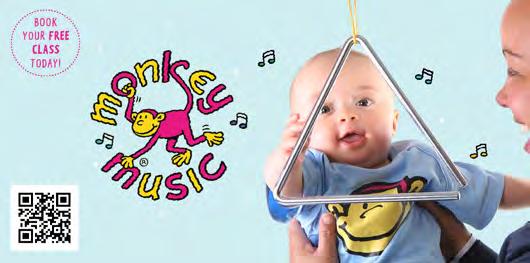
South Meadow Lane, Eton, SL4 6EW
Open from 2.30-5pm https://collections. etoncollege.com/museums/natural-history-museum
LITTLE WRIGGLERS
Norden Farm Centre for the Arts, Maidenhead SL6 4PF 10am www.norden.farm

JUNIOR YOUTH THEATRE
Norden Farm Centre for the Arts, Maidenhead SL6 4PF 4.55pm www.norden.farm
MINDFULNESS FOR CHILDREN
Norden Farm Centre for the Arts, Maidenhead SL6 4PF 4-7 years 11am; 8-11 years 12pm and 12-15 years 1pm www.norden.farm



The Lookout Discovery Centre, Nine Mile Ride, Bracknell RG12 7QW www.bracknell-forest.gov.uk/leisure-services/ look-out-discovery-centre/toddler-days
Norden Farm Centre for the Arts, Maidenhead SL6 4PF 11am www.norden.farm
Windsor Great Park Environmental Centre (access is via Forest Gate SL4 2BY)
Outdoor nature play, crafts and stories for preschool aged children www.windsorgreatpark.co.uk/naturetot
COMIC CLUB
The Story Museum, 42 Pembroke Street, Oxford OX1 1BP
Develop your comic making skills. Awesome comic artist, Neill Cameron, will be on hand to offer helpful advice and tips. www.storymuseum.org.uk/whats-on/comicclub-2021
SATURDAY

NATIONAL STORYTELLING WEEK
www.sfs.org.uk/national-storytelling-week
LITTLE WRIGGLERS
Norden Farm Centre for the Arts, Maidenhead SL6 4PF 10am www.norden.farm
JUNIOR YOUTH THEATRE

Norden Farm Centre for the Arts, Maidenhead SL6 4PF4.55pm www.norden.farm

WEDNESDAY
LITTLE WRIGGLERS
Norden Farm Centre for the Arts, Maidenhead SL6 4PF 11am www.norden.farm
CHILDREN’S MENTAL HEALTH WEEK www.childrensmentalhealthweek.org.uk
Windsor Great Park Environmental Centre (access is via Forest Gate SL4 2BY)
Outdoor nature play, crafts and stories for preschool aged children. www.windsorgreatpark.co.uk/naturetots
Guildford
Escape room style experience. Start times are between 9am and 2pm from a secret starting location emailed to you ahead of time www.cluedupp.com/products/alice-guildfordfebruary
Windsor Castle Learning Centre, Windsor Castle SL4 1NJ
Create some fabulous treasures before heading to The Castle to hunt for the real thing. 10am3pm.Free upon admission to the Castle.
Odds Farm Park, Wooburn Green HP10 0LX
Meet newborn lambs taking their first steps in the Little Hooves Lamb Nursery www.oddsfarm.co.uk
RAPUNZEL AND THE TOWER OF DOOM
The Story Museum, 42 Pembroke Street, Oxford OX1 1BP
www.storymuseum.org.uk/whats-on/rapunzeland-the-tower-of-doom
MONSTER SQUID FUN WITH AARON BLECHA
The Story Museum, 42 Pembroke Street, Oxford OX1 1BP
Interactive draw-along event 8+

Adults must accompany children at this event and all audience members must have a ticket www.storymuseum.org.uk
MAIDENHEAD HERITAGE CENTRE
18 Park Street, Maidenhead SL6 1SL
Why not book their Spitfire Simulator experience for half term! www.maidenheadheritage.org.uk
Wycombe Swan, St Mary St, High Wycombe HP11 2XE
Performances at 10.30am, 1.30pm and 3.30pm (Wed and Thur) and 4.30pm (Tue) www.wycombeswan.co.uk
The Kenton Theatre, 19 New St, Henley-onThames RG9 2BS
Performances at 1.30pm and 5pm www.kentontheatre.co.uk/event/the-jungle-book
THE NOISE NEXT DOOR: MYSTERIOUS MANSIONS OF MYSTERY
Norden Farm Centre for the Arts, Maidenhead SL6 4PF
A little bit spooky, a little bit stupid and a whole lot of funny.
Performances at 11.30am and 2pm www.norden.farm
LEGO MASTERS CLUB
The Story Museum, 42 Pembroke St, Oxford OX1 1BP
Calling all young engineers, architects and inventors. Build a story with with LEGO! www.storymuseum.org.uk/whats-on/legomaster-builders-club-ages-5-8
HOW TO DRAW STAR WARS WITH JAKE
The Story Museum, 42 Pembroke Street, Oxford OX1 1BP
Interactive draw-along event 6+

Adults must accompany children at this event and all audience members must have a ticket www.storymuseum.org.uk
SING-A-LONG-A ENCANTO
Wycombe Swan, St Mary St, High Wycombe HP11 2XE 1pm www.wycombeswan.co.uk
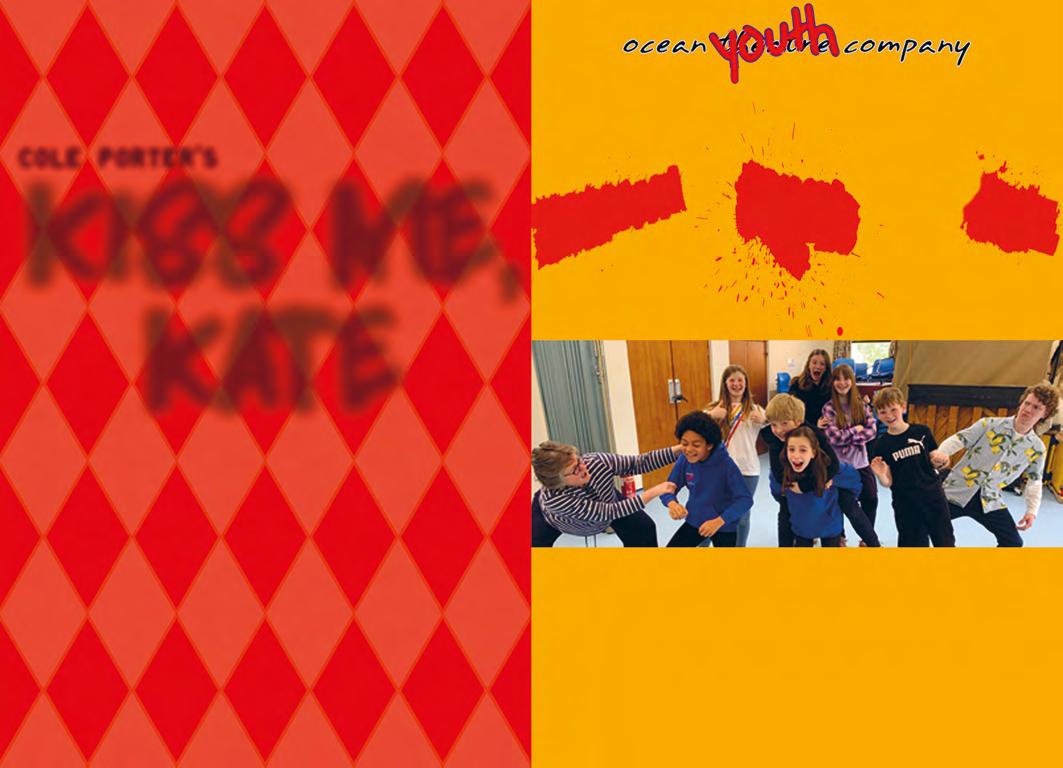
The Lookout Discovery Centre, Nine Mile Ride, Bracknell RG12 7QW www.bracknell-forest.gov.uk/leisure-services/ look-out-discovery-centre/toddler-days
NATURE TOTS
Woolley Firs, Cherry Garden Ln, Maidenhead SL6 3LJ
Outdoor nature discovery for preschoolers. www.eventbrite.co.uk/e/nature-tots-woolley-firsfriday-24-february-tickets-449445382237
This month Rachel Bailey talks to author Hannah Gold whose first novel The Last Bear was the bestselling children’s hardback debut of 2021 and winner of the 2022 Waterstones Children’s Book Prize, The Blue Peter Children’s Book Award and The Times Children’s Book of the Week. Beautifully illustrated by Levi Pinfold, each of Hannah’s stories deliver an important, heartfelt message on ecological issues and climate change.

Having
When I was young, I adored reading, especially books starring animals. To be an author just seemed like ‘The Dream Job!’ This passion for literature led me into working in the film/ theatre industry but the desire to write my own children’s book never went away. It was only when I reached my mid-40’s that I thought, “well it’s now or never!” So, I emptied my heart onto the page and wrote about all the things that truly mattered to me. The result was my debut novel, The Last Bear, which is all about the friendship between an 11-year-old girl and a wild polar bear. Your books deliver some very important messages on big issues affecting our world today. How would you encourage young readers to make a difference or find their voice in the fight against climate change?
First and foremost, my main goal is to focus on delivering a wonderful, engaging adventure story. Children always spot when you’re trying too hard to be worthy. So, any message is subtly woven through the thread of the book. At the end, I like to leave my readers with an empowering message - a feeling that they can achieve amazing things. My take-home point is always to focus on small changes and to never be afraid to speak up - or roar - for change.
and the terrible impact this is having on them. It was the same with The Lost Whale. I am utterly fascinated by whales and think they’re one of the most wondrous animals but again, it was hard to write about them without talking about the challenges they face.
Levi’s stunning illustrations add another dimension to the stories. How important is that partnership between the author and the illustrator?
Levi is such a talented illustrator and his drawings add so much breadth to my books. I love how in The Lost Whale he captures the sheer vastness and beauty of White Beak, the grey whale, and yet all her vulnerability too. I trust him implicitly to add extra nuances I will never have thought of and whenever I receive his drawings I get a thrill of anticipation to see what he has come up with!
Are you an avid reader? Do you have a favourite book you wish you’d written?
Please find below a proof of your advertisement for the July/August 2021 issue of Families Chiltern (Issue 110).

Did you set out to write a novel about climate change or did that idea develop once you’d chosen a polar bear as your main character?
The truth is I never set out to write a book about climate change. At heart, I simply wanted to write a book about friendship as I’m fascinated by the often magical relationship between children and animals. It was only when I was researching polar bear habitat, that I realised it was impossible to write a contemporary story about polar bears without referencing the loss of sea ice
The love of reading has never really left me and the book I wish I had written is probably Narnia. I do love a portal adventure, especially with talking animals. Would love to write my own Narnia one day - but with a hopeful eco twist!
Please CHECK ALL INFORMATION IS CORRECT especially dates, telephone numbers and addresses. Any changes need to be made at this stage. Any further amendments will be charged for. Please contact us by return either to amend or approve your advertisement.
If a whale watching trip inspired your second book, would you consider shark cage diving as research for another story?
Haha I’m not sure I’m brave enough to try shark cage diving! Saying that, I do think it’s important that we write about all sorts of animals, particularly ones often perceived as ‘bad’. At the time of writing this, I’m still not allowed to say what Book 3 is about, but I can reveal that a sneak preview will appear at the end of the paperback version of The Lost Whale! So, watch this space.
The Lost Whale, Hannah’s second novel illustrated by Levi Pinfold, is out in paperback in February priced £7.99.
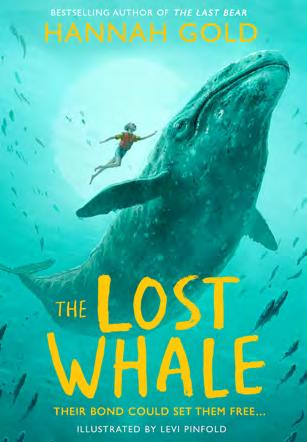

@hannahgold_author @HGold_author
@AuthorHannahGold www.hannahgold.world
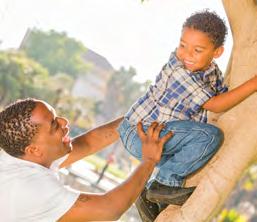
Modern technology enables children to live a largely sedentary and ‘safe’ existence. However, research by Play England shows that ‘age-appropriate risk’ is an essential component of a balanced childhood, allowing children to experience fear and learn the strengths and limitations of their bodies. So, go ahead, hold your breath and allow your kids to indulge in some ‘dangerous’ activities – of course, under the supervision of a responsible adult AT ALL TIMES.
Driving a nail into wood is a valuable skill and harder than it looks. A poorly hit nail can fly up unpredictably so eye protection is vital. Show your child how to hold the hammer in the middle of the handle and keep the nail in place by holding the bottom with their finger and thumb. GENTLY tap the hammer on the top of nail. Once the nail stands up on its own, they can move their hand away and use greater force.
For tips, see https://bit.ly/safehammer

Children find fire fascinating. In the past, it was an everyday part of family life but, nowadays, many children don’t encounter fire unless we deliberately introduce it to them. It’s better for them to learn the basics safely with you, including what to do if something goes wrong, rather than playing with fire in a riskier situation.
For step-by-step guidance, visit https://bit.ly/pwintrofire
Challenging your child to live blindfolded for an hour will teach them how to better use their other senses but also build empathy and awareness for non-sighted people. Whether you use a scarf, tea towel or large hanky, it’s important the blindfold is snug and doesn’t let in any light so your child’s other senses are activated.
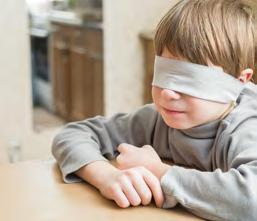
To try some fun blindfold games, visit www.blindfoldsensoryplay.com.au
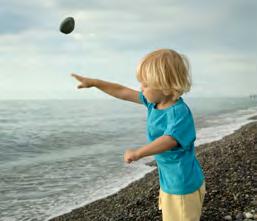
It’s almost impossible to take young children for a walk in the woods or along the beach without them picking up a stick, rock or seashell and throwing it. Children love the feeling of propelling an object away from their body and watching where it goes. Channel this urge by teaching your child the situations in which it’s both fun and safe to throw an object eg skimming a stone on water.
For guidance, visit https://bit.ly/NTskimstones
Another life skill that develops with experience (and guidance) is using a knife safely.
Whittling or wood carving is fun and creative and a great way to introduce kids to safe knife skills. They will soon become proficient and able to tackle using knives in the kitchen, with your guidance.
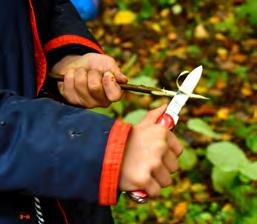
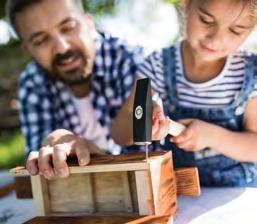
For some great tips, safety advice and simple projects, visit https://bit.ly/safewhittling
Children cannot resist hauling themselves up a tree. According to many experts, this should be encouraged as it motivates children to challenge themselves in a fun and physically active way. It is, after all, the number one adventure on the National Trust’s list of 50 things to do before you’re 11¾.
For guidance on how to tackle a tree, visit https://bit.ly/NTclimb
This classic, explosive science experiment is simple but has a spectacular impact on children when the coke shoots metres into the air!

Be warned though, this experiment is very messy and sticky and must be performed outside.
This ancient British game has, in recent times, sometimes been regarded as unsafe.
However, it’s only really risky when played incorrectly or when children are deliberately trying to hurt each other. For anyone not in the know, the game of conkers involves using a conker on a string to try to knock your opponent’s conker off its string. For tips and advice such as when to look for conkers, how to prepare them for a game and tips on winning, visit https://bit.ly/WTconkers

There is a pride and empowerment that comes with being in control of your money. What’s more, we can pass on this attitude and basic money management skills to our children and help them get money savvy too. With the rising cost of living, many of us are looking for easy and practical moneysaving tips. Here are some of my favourites.
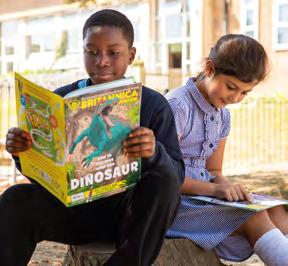
This winter, turn your central heating thermostat down by just one degree – it can save you up to ten percent a year on your bill.
Pop a tent or gazebo over your laundry line, it will allow the washing to dry without using the tumble dryer.
Turn off the radiators in the rooms you’re not in.
Is your bedroom cold? Switch on your electric blanket to get your bed warm; a forty watt electric blanket will warm up your bed for just two pence per hour.
Dig out your slow cooker. It costs ten pence per hour to use compared to your oven at fifty two pence per hour.
Free apps like Too Good to Go (www.toogoodtogo.co.uk) allow you to purchase unsold food at a big discount from top eateries at the end of service.
Invest in good-quality backpacks for days out so you and the kids can carry water bottles and snacks, rather than buying when you’re out.
Parking on days out can be expensive, so I use Your Parking Space app (www.yourparkingspace.co.uk). It tracks where you
 © FP Focus Point Photography
© FP Focus Point Photography
are and finds cheaper parking alternatives.
Review your subscriptions. Is there anything you can do without?
Sell your unwanted items on eBay, especially clothing. Maximise your selling potential by ironing the items nicely and hanging them on matching wooden hangers. Always use the full free twelve photo allowance with close-ups of any logos. Photograph your items in natural light.
When travelling abroad, pack smart. Don’t buy sunscreen and essentials at the airport or a tourist destination as it will always be more expensive. Check for deals beforehand in high street stores and supermarkets. Also be sure to take medications like painkillers and sting and bite relief creams with you as these frequently cost much more aboard.
Gemma Bird, aka MoneyMum, is a social media sensation. She shares her practical and savvy money-saving tips on Instagram @moneymumofficial to help parents through economically challenging times.

Bulk out a meal like a spag bol with carrot so you use less meat.
Buy frozen veg so there is less waste and when buying fresh fruits and veg, buy loose where possible, as its cheaper.
Freeze leftover fresh fruit. A quick Google search will tell you which fruits do and don’t freeze well.
Grab a scanner at your local supermarket to keep track of your spending; make a shopping list and stick to it.
Consider switching to own brand items, especially for more expensive things like laundry detergent and dishwasher tablets.
Go through what ingredients you already have and plan the week’s menu using these.
Join supermarket mailing lists and newsletters for great savings. There’s often money off your first online shop so sign up with all the stores that offer this. Then shop with a different one each week to maximise savings.
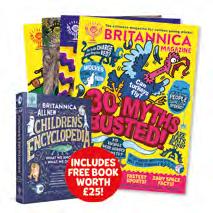
Sixty five percent of my followers said they would try these hacks!

Every New Year we are inundated with health, fitness and self-improvement messages. Often, if we do decide to challenge ourselves and make a change, we don’t feel adequately supported and quickly lose motivation. One way of addressing this is to take on a new challenge as a family. Not only do you all have to get up off the sofa but you get to spend quality time with each other too!
Does your family thrive on a bit of competition? You could make your challenge a goalorientated one. Or perhaps you have family members who want to nail screen time, healthy eating or exercise? Call a family meeting and decide which challenge will suit you all. If you can’t decide, hold a vote! Here are some challenge ideas.
We know that spending time in nature is good for you and science backs it up. Challenge each other to name different trees on every walk you go on, see shapes in clouds, identify birdsong; whatever it takes to draw the family into the fresh air.
The RSPB has some great wild challenge suggestions for families; check out fun and learning at www.rspb.org.uk.
If you decide as a family to spend less time on devices, there are some great apps like AppDetox or AntiSocial which can help. Plan family fun as a healthier and more inclusive use of your time.
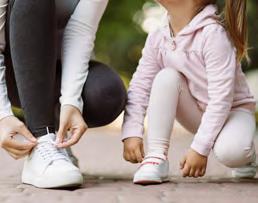

Coach Martin Sharp (www.martinsharp.com) suggests a family running challenge. ‘You could keep it simple and see how many laps of the park you can all do. But if you want to make it more exciting you could enter a Color Run (www.colorrun.co.uk) or a Tough Mudder (www.toughmudder.co.uk) says Martin. ‘Exercise doesn’t have to be the same thing day-in, day-out; with a bit of imagination it can turn into a grand adventure.’
Make a family chart and log everyone’s goals and achievements.

Bored with your normal meals? Inspire yourselves by researching healthy ingredients you’ve never tried before. Then plan a family challenge to cook meals from around the world. Everyone gets to try something they’ve not eaten before.

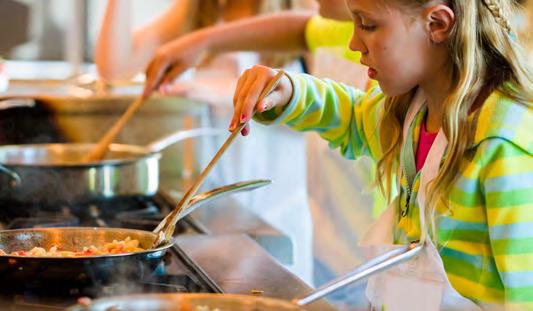
In this stressful world, taking time to ‘just be’ is so important. Try some relaxing yoga and meditation every evening for just five to ten minutes, for a month. Insight Timer (www.insighttimer. com) is a free meditation app, packed with different tracks and exercises.

Fitness expert Lauren Allen (www.strongasamum.co.uk) suggests using playing cards to mix up workout challenges. Allocate a movement or an exercise to each suit. For example, clubs is squats, spades is push-ups, diamonds is star jumps and hearts is high knees. Shuffle your deck and deal out the whole pack to everyone. The number on the card represents how many repetitions of the exercise you need to complete. Set a timer and whoever clears their hand in the quickest time wins the round.
Try a new activity that stretches the family’s comfort zone, such as ice skating, wild swimming, rock climbing or paddleboarding. Set yourself an achievable goal and get started!
Cook up your own version of Come Dine with Me, with the aim of making your meals healthier. Social media platforms are full of inspiring chefs whipping up feasts you can copy at home.

